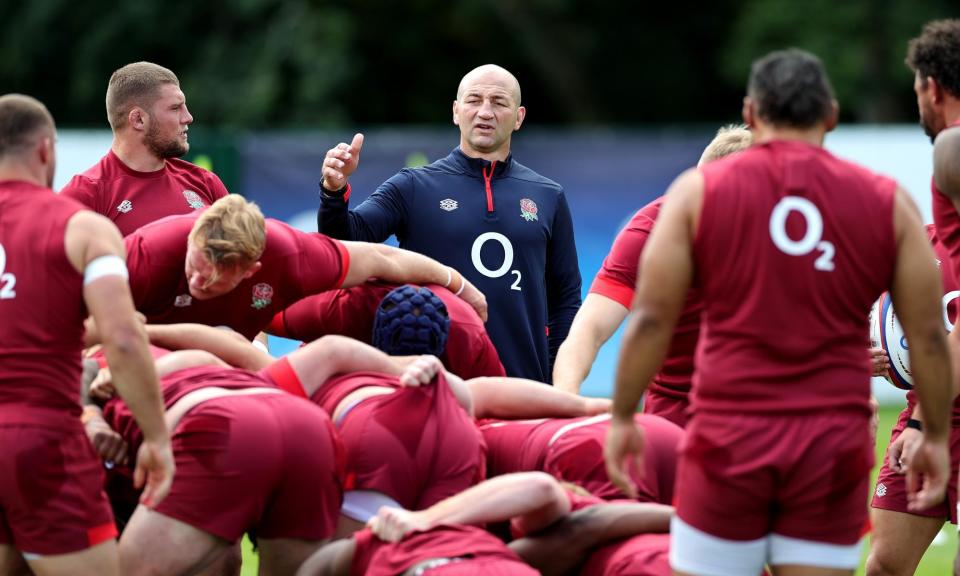England’s rugby future looks rosier with pathway to world-beaters

That old proverb about reaping what you sow applies to rugby union more than most sports. Neglect your grass roots or your future crops and, sooner or later, it will catch up with you. Even in England, with its bigger playing numbers and resources, there can be no sidestepping the consequences of a fractured player development pathway.
One men’s Six Nations grand slam since 2003 remains one of the more sobering Twickenham statistics – and an obvious goal for those charged with producing England’s next batch of white-shirted stars. Yes, there have been two World Cup final appearances over those two decades but, lately, England has developed significantly fewer World XV candidates than, for example, South Africa, France, New Zealand or Ireland.
Related: Alfie Barbeary could be banned for start of England’s Six Nations campaign
How interesting, then, to hear an expert in this particular field insist that some potential English world-beaters are lurking just over the horizon. They won’t be ready to rumble in next month’s Six Nations, or maybe even the 2027 World Cup, but England’s seasoned U20 head coach Mark Mapletoft firmly believes the longer term outlook is rosier. “I genuinely think young English players are as good as any in the world now,” he says. Would he be inclined to put his money on England winning the 2031 World Cup? “I certainly would be, if we get it right.”
Mapletoft, now back for a second stint with England U20s after a decade at Harlequins, has already seen enough to predict that six to eight – and maybe as many as 10 – of this year’s U20 intake have what it takes to be future Test players, an unusually high number. He prefers not to nominate specific individuals at this slightly premature stage but points to some of England’s recent age-group results. “If we’re in such a bad place, how come our U18s put 60 points on Wales, 50 points on Ireland and beat France 41-0 last year?”
So what has changed? The knowledgeable Mapletoft played alongside many of England’s 2003 World Cup winners and, in his previous stint with England’s age-group sides between 2008-10, oversaw an U20 grand slam and two junior World Cup final appearances. With the “golden generation” of Owen Farrell, George Ford, Elliot Daly et al subsequently emerging, England had the fledgling talent to compete with anyone. “We thought the 2015 World Cup, even though it was at home, would be too soon for us, but 2019 was the target,” recalls Mapletoft. Ultimately we fell at the last hurdle but we had a good squad.”
Somewhere along the way, however, the gushing fountain dried up. According to Mapletoft, the first worrying cracks were visible lower down the pipeline around 2013 and 2014, even though England won another junior U20 World Cup in 2016. “I can categorically say the cohort of academy players we had up to those years had the potential to go on to become good players. Then there was a definite drop off. And if it was happening at Quins, who were probably one of the best academies, it had to be happening elsewhere. Something went on around that space. Among other things I think the game got away from us financially at club level. There was clearly a lot of uncertainty around who was doing what, where and how at Premiership level. And then – boom – suddenly Covid came. I think it just set us back.”
It is only more recently, for instance, that full-time RFU staff have once again been hired to help players along the pot-holed pathway. For two or three years coaches attached to Premiership sides had previously been invited to double up, raising hackles among other rival clubs. “With all due respect those clubs don’t want staff from, say, London Irish contacting their players outside of competition time,” suggests Mapletoft.
There was also an increasing disconnect with the national senior coaching panel. “We’ve already had one meeting with Steve Borthwick about the pathway, which is one more than we had previously,” reports Mapletoft, who won a solitary England cap against Argentina in 1997. Reviving the England A team, to provide a crucial testing ground between the Premiership or international rugby, should be another major plus.
“Alongside a focus on the 2027 World Cup in Australia there has to be an underlying focus on 2031 in the United States,” continues the ex-Gloucester, Quins and London Irish fly-half. “The alignment piece between the ages of 16 to 20 is pointless if it doesn’t also exist between 20 to 24. The A team is a massive step in the right direction. Our job is not to produce world-class U18 or U20 teams. Our job is to produce world-class players to play in a world-class England team.”
And could it be, for all English rugby’s other current off-field arguments and the rising expectations across the Channel, that they get there sooner than anticipated. Despite heavy weekend defeats for Saracens and Leicester, six Premiership clubs should qualify for the last 16 of the Champions Cup. England’s former head coach Stuart Lancaster, now in charge of Racing 92, is among those who sense a youthful English renaissance. “The Premiership has improved. I thought Northampton were excellent the other night and so were Harlequins. The unintended consequence of three teams folding last season is that the other teams have got stronger.”
So watch this space. Beneath Borthwick’s reshuffled 2024 Six Nations squad list, to be unveiled this week, things are finally stirring. “There are a number of U20 players here who have the physical and rugby capacity to make it at the top level,” repeats Mapletoft. England to win the 2031 World Cup? Remember where you heard it first.
This is an extract taken from our weekly rugby union email, the Breakdown. To sign up, just visit this page and follow the instructions.

 Yahoo Sport
Yahoo Sport 



































































